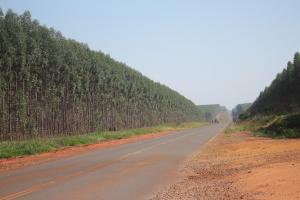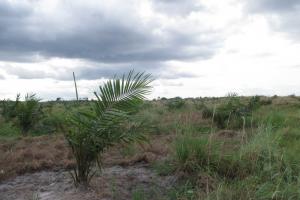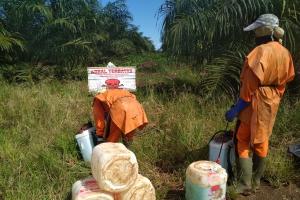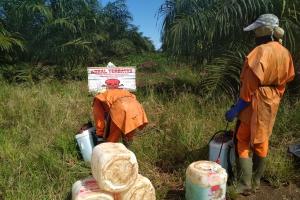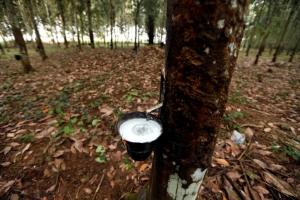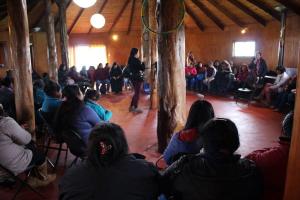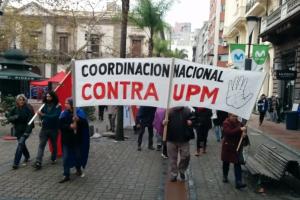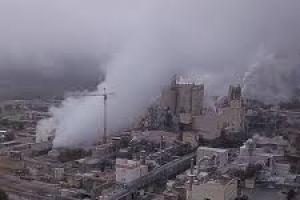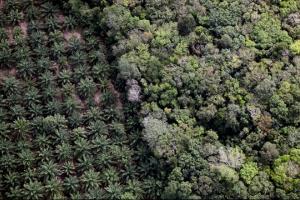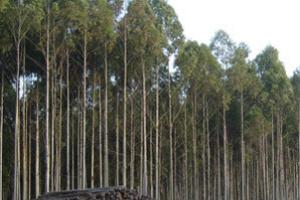Public letter from Brazilian organizations to the International Union of Forest Research Organizations (IUFRO) World Congress, which takes place from 29th September to 5th October 2019 in Curitiba, Brazil.
Large-Scale Tree Plantations
Industrial tree plantations are large-scale, intensively managed, even-aged monocultures, involving vast areas of fertile land under the control of plantation companies. Management of plantations involves the use of huge amounts of water as well as agrochemicals—which harm humans, and plants and animals in the plantations and surrounding areas.
Bulletin articles
30 September 2019
“Shock” is a common reaction when a crisis emerges… or when it comes to light. However, it also provides a convenient smoke screen for governments, financial institutions and companies behind which they can hide their own role in and responsibility for the current crises in the forests.
Bulletin articles
30 September 2019
The Singapore-based OLAM company has secured access to 500 thousand hectares of land in Gabon to set up large-scale oil palm plantations, a country with 85% of forest coverage. How can OLAM then claim to follow a “zero deforestation” commitment?
Bulletin articles
30 September 2019
Exploitative working conditions in the oil palm plantations’ industry in Indonesia are persistent and the main victims are mostly women. Although this situation is often overlooked, the production process of the world’s largest producer of palm oil is strongly influenced by its existence.
Bulletin articles
30 September 2019
Bulletin articles
30 September 2019
The industrial production of natural rubber has always been synonymous with destruction and exploitation. About 70% is used to manufacture tires. As the use of cars, trucks and airplanes increases, the use of rubber will also increase. And this does not come without controversy.
Bulletin articles
30 September 2019
The Network of Women’s Organizations of Tirúa, in south central Chile, is deploying strategies for life to prevail in this region. This territory has been threatened by the massive invasion of tree plantations, which state policies continue to promote.
Other information
30 September 2019
At the end of July 2019, UPM confirmed that it will install a second pulp mill in Uruguay. This megaproject will produce up to 2.33 million tons of cellulose per year, this means significant environmental, social, and cultural damage. This project does not have social license. Several social organizations, local citizens’ groups, and stakeholders have expressed their concerns about the ways in which the megaproject will affect their lives and their concerns have not been properly addressed by the public consultation process.
Other information
30 September 2019
The campaign, “Territorial Voices on the MAPA Project: Testimonies about the mega-expansion of Celulosa Arauco,” seeks to shine a light on testimonies about the impacts of this project that aims to triple the production of the Celuloca Arauco plant in Chile. The Ojo de Treile Collective has produced a series of micro audiovisual capsules to take a stand against the most ambitious plantation industry project in the history of the country, which is threatening to further interfere with forests and ancestral territories.
Other information
30 September 2019
TV Yle, Finland’s national public broadcasting channel, has produced a documentary about the participation of Stora Enso, a Swedish-Finnish pulp giant that is part of Veracel Celulose. Veracel Celulose is a company in Brazil accused of land grabbing, bribery and environmental and labor crimes. It is worrisome that the police have arrested people interviewed in the documentary, such as farmer Geraldo Pereira.
Other information
30 September 2019
RSPO is the most widely used voluntary certification system for palm oil companies and it hold its 3rd African Sustainable Palm Oil Conference in Accra, Ghana on August 2019. But Friends of the Earth Africa groups exposed it as a greenwashing label. Cases of environmental degradation and rights violations remain visible in many of the plantations that have the label. They also blame the activities of oil palm plantation companies for biodiversity loss, increased poverty, human rights violations and the climate disaster in Africa, among others.
Other information
30 September 2019
This report -by Anne Petermann and Orin Langelle, Global Justice Ecology Project- examines events and research publicized between 23 June and 4 July 2019 that discuss the mass-use of trees to enable the unsustainable lifestyles of the world’s top 1% in the face of looming ecological catastrophe: from trees genetically engineered to feed the “green” manufacture of energy, plastics and chemicals; the planting of trillions of trees to reduce global atmospheric carbon levels; and “reforms” to the economic system to allow future profit-making under the guise of biodiversity pr
